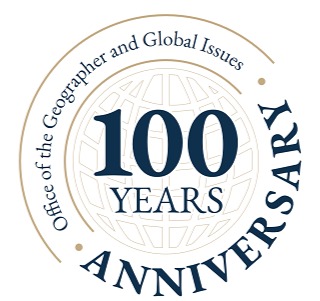In celebration of the 100th anniversary of the U.S. Department of State’s Office of the Geographer and Global Issues, and as a demonstration of their commitment to open data, its MapGive initiative is partnering with YouthMappers to support the next generation of geographers! YouthMappers is excited to announce this partnership with MapGive. MapGive is a U.S. Department of State initiative that encourages and increases participation in the global mapping community and facilitates the creation of open geographic data to support humanitarian relief and development programs. MapGive is sponsoring an impressive cohort of student projects that showcase the importance of open data as a public good.
The YouthMappers’ fieldwork program supports YouthMappers chapters to undertake projects related to the creation of new data and/or analysis in the chapter’s local or regional community. As a public diplomacy initiative encouraging participation and building capacity in the global open mapping community, MapGive is thrilled to help students around the world pursue projects which will help them develop key skills, build professional networks, and gain invaluable experiences, while contributing meaningful open data and analysis for more sustainable development.
This year, funding was awarded to the following four chapters in different parts of the globe whose projects focus on using geospatial data to address slum conditions, improving sanitation and hygiene access through field data creation, and filling data gaps in newly urbanized areas using field photo mapping. Awardees include YouthMappers chapters in Bangladesh, Paraguay, and also a close collaboration between two chapters in Uganda!

Chittagong, Bangladesh
Sanitation and Hygiene Scenario in the Slum Community: A Fieldwork Program on Shanti Nagar Slum, Chittagong, Bangladesh
The project aims to fill a sanitation and hygiene services data gap through field surveys and geospatial mapping to address slum conditions in Chittagong, Bangladesh. The CUSS YouthMappers will collect data about the present structural, sanitation, and hygiene conditions of the latrines and update information on a public OpenStreetMap (OSM) platform. They plan to map the geographical distribution of latrines, including vulnerable and unhygienic ones, to show the accessibility and availability of proper sanitation services to slum communities.

Asuncion-Ciudad del Este road corridor, Paraguay
Support for the Atlas Urbano Py project in the field photo mapping of the
municipalities of Coronel Oviedo, Jose Domingo Ocampos, Juan E O'Leary, Malloquin, Yguazu, and Minga Guazu
The project aims to create a workflow to fill in a gap of updated geospatial data to understand the urban characterization of cities in Paraguay. The students will produce freely available base layers of cartographic data (buildings, vegetation, and water) of cities' locations in the Asuncion-Ciudad del Este road corridor.

Kampala, Uganda
Innovative field mapping of health vulnerability in marginalized Kampala refugee communities - Reproducing Ramani Huria field data models in water and sanitation mapping
The project aims to create a WASH field data model for urban areas, an interactive web map visualizing the collected data and showing the distribution of WASH points across the study area, static paper maps showing which water points were identified as likely safe from contamination determined by their proximity to different contamination sources.
Students will map all categories of clean water sources within Kisenyi, Katwe, and Kabalagala refugee settlements in Kampala city using field data collection techniques. Students will also identify buildings with toilets and other contamination sources such as waste deposit areas using open source technologies.
The chapter intends to train its members on the fieldwork processes, tools, and data collection. And contribute to the development of a WASH model for urban areas, blogs and social media posts detailing student workflows and WASH issue discussions.

Entebbe, Uganda
Improving health center accessibility in Entebbe municipality
Accessibility to health centers in Entebbe Municipality can be a great challenge, especially to heavily expectant, lactating mothers, and their babies. The municipal authority through the Ministry of Health has recruited the Village Health Teams to curb this problem, but a lack of information on health center locations is slowing progress.
The Vision Mappers chapter seeks to establish the location of healthcare services in the municipality and improve their data collection abilities with key digital open source tools like Kobo Collect.
The team will create both static and digital maps for the municipal authority in an effort to re-enforce the use of data driven decision-making and improve overall health in the municipality.
MapUganda has successfully added Entebbe municipality buildings and roads to the OpenStreetMap database, however additional validation and validators are needed.
We are excited to support these chapters with their projects and are grateful for their time, effort, and willingness to tackle pressing issues directly! Follow the chapters (see links in the above descriptions) and us at @YouthMappers and @MapGive to get additional updates on these projects and our programs in the coming months.
This was a collaborative announcement between YouthMappers and MapGive. View MapGive's announcement here.





Comments